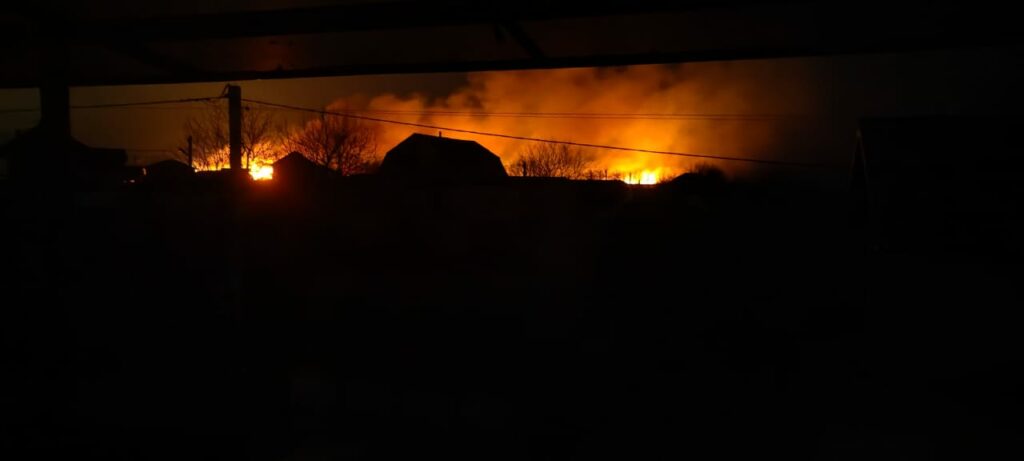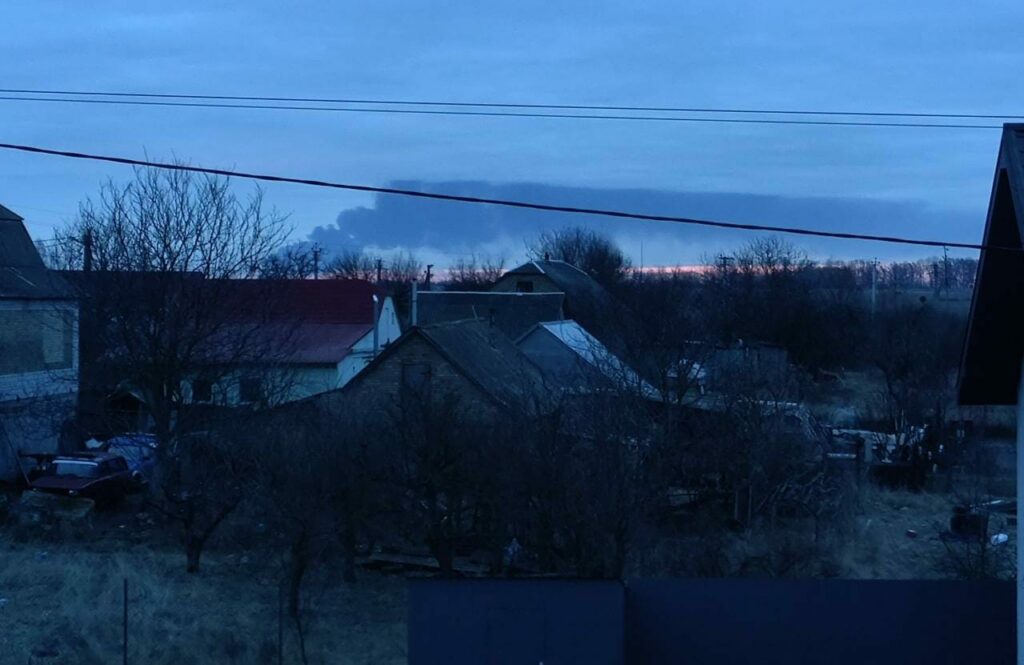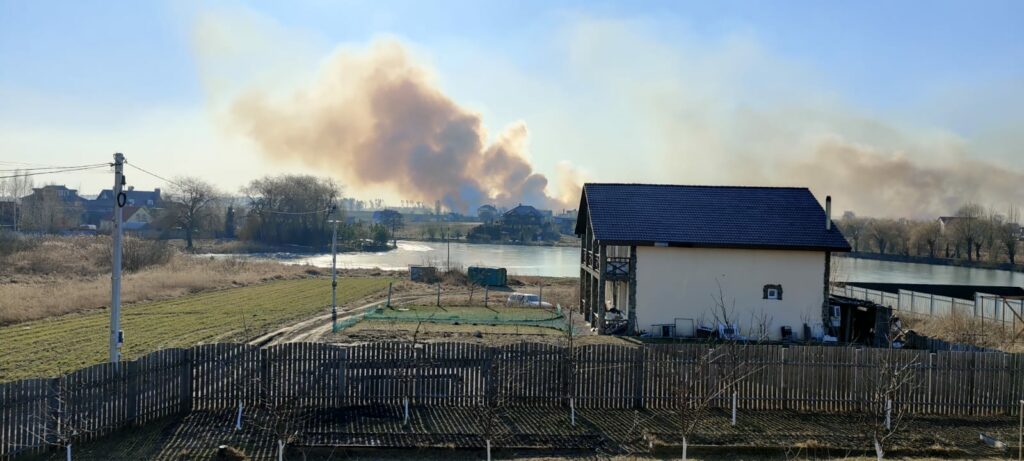David Ceschia, born in Brussels, was one of the 276 Belgian citizens reported to be in Ukraine at the outbreak of the war. Trapped by explosions, heavy fighting and occupying Russian forces, he made a daring escape with his Ukrainian partner.
On February 24, Russia launched an all-out offensive against Ukraine. Having failed to achieve its day one objectives, Russian forces quickly changed tactics, targeting civilian infrastructure and killing thousands of civilians in the process. The conflict has already displaced over two million people, with most finding refuge in neighbouring Poland and Hungary.
Ceschia is no stranger to Ukraine. Having first moved there in 2007, the Italian-Belgian worked across the country on energy efficiency and renewables programmes on behalf of European governments. In fleeing Ukraine, Ceschia left behind property, work, friends and family. Now safe in Moldova, Ceschia reflected on his escape.
“It was mayhem,” Ceschia said, “We were not expecting this at all.”
Nowhere to run

The aftermath of an airstrike 100m from Ceschia's family home. "I thought we were going to die." Credit: David Ceschia
At the outbreak of the conflict, Ceschia and his girlfriend made the decision to seek refuge with family in the village of Buzova, around 40 km west of Kyiv. They later regretted this decision after finding themselves cut off and surrounded by Russian forces.
“We thought, this is the countryside, they might pass, but the village won't be a target. Except it was. The Russians started to make a sort of perimeter to surround Kyiv, which went straight through the village of Buzova,” Ceschia explained.
Their quiet family village, supposed to be a place of refuge for Ceschia’s family, quickly became a focal point for the battle for Kyiv.
“We had a missile strike a hundred metres from our home… They were big. We had several air strikes made by helicopter in a nearby area.”
Translation: So it would appear that they are basically trying to open a way to get to where the bombing was for the past three hours. There was a stadium that they blew apart to allow the tanks to access the roads that lead to Kyiv. It was immediate and shocking.
A few minutes down the road from the village of Buzova, a small leisure airstrip became the scene of a large battle involving Russian helicopters and aerial bombardment. Ceschia watched as explosions and rockets shook the landscape while his family sheltered in their small village home.
“A jet came over and I saw it as it was approaching. I woke up and I saw it, it was about 60 feet off the ground. It dropped something that looked like a rocket, or flares. At the moment this happened, all the lights went out,” the Belgian citizen said.
Russian forces deliberately targeted the area's local electricity substation, cutting off power to the region and cutting all communications. At this point, escape was nearly impossible. Ukrainian forces had destroyed an important bridge towards the city of Zhotymr, trapping Ceschia between his village and Kyiv.
A desperate escape

Smoke billows from the Oil refinery in Vasylkyv, which exploded after Russian bombing. Credit: David Ceschia
As the explosions crept nearer, Ceschia made the decision to flee the village, however impossible the odds. “It was a fairly easy decision for my part,” he said, “but my girlfriend said the problem was to convince her mother, her grandmother, and step-father who were particularly resistant to moving, who wanted to stay home.”
After several heated and emotional arguments, Ceschia’s girlfriend’s family were persuaded to leave. The journey would not be easy. The family had three dogs and six cats – no easy feat to transport in an active warzone.
“We had to verify the amount of fuel we had because it was quite limited and we couldn't just get more. We couldn't find any in the village but we only had enough for around 150 km. We had 340 km to travel,” Ceschia recalled.
With what little fuel they had, the family set off. They drove in a convoy of two cars, as the sound of Kalashnikovs and machine guns echoed around them.
After a tense journey, the family arrived in the city of Vinnytsia, in west-central Ukraine, where Ceschia found a relatively safe place for his girlfriend’s family. Much of his girlfriend’s family didn't initially leave, due to their many pets and the fear of abandoning their homes.
Fortunately, the rest of the family would later find safe passage into Poland on 8 March. His girlfriend’s step-father would later return to the Kyiv area, helping the war effort near their now-occupied village.
To the border
Translation: We are on the road and have done the first 25 minutes. I would say they were the most critical because I was very afraid there would be fighting, for the moment we have not encountered anything. We hope this continues until we reach our destination.
From Vinnytsia, Ceschia had an easier escape than many. Setting off at 07:30 after spending several days staying with friends, they reached the Mohyliv-Podilskyi border crossing with neighbouring Moldova.
“We were waiting in line close to the border for about half an hour. They checked our documents in about 30 minutes, we waited another 30-40 minutes maximum in Moldova. It was extremely fast and over within an hour and a half."
Ceschia is now considering what to do next. He has left his home, belongings, and family behind. His girlfriend, a Ukrainian national, must also think about her future outside of Ukraine.
“The bureaucracy surrounding refugee status is still quite confusing. We have three months without a visa. We will try and find a better option,” he said.
“Our aim is to get to Brussels because I have a place we can stay. I honestly think we should think about what that means… It’s not going to be a two-week stay. More likely it will be some months before we know whether it’s safe to go back,” Ceschia said.
Longing for home
Ceschia and his girlfriend and family are safe but at a great cost. He fears having lost almost 15 years of his life as his home was violently engulfed in war. "It’s a feeling of sadness, of anger, of sorrow in so many ways. You’re being stripped of part of your life."
"The most atrocious moment, that will stick with me forever, is when my girlfriend had to say goodbye to her mother and grandmother… Seeing in all their eyes the question whether this would be the last time they see each other."
He now wants his story to be heard, not just in Europe, but across the border in Russia as well. He lamented the state censorship that prevents the Russian public from knowing what is really happening.
Related News
- ‘Like a nightmare, but worse’: two Ukrainian women on the run to Poland
- Thousands of Ukrainians reach Belgium, reception centres overwhelmed
"These people are living in a completely different reality. They think that Russia is in Ukraine to free them from Neo-Nazis, that they’re going to safeguard Chernobyl from bad Ukrainians who are going to destroy it."
While Ceschia was able to escape, others have not been so fortunate. Russian bombing campaigns, launched in the name of so-called "de-Nazification", have cost the lives of thousands of civilians.
On 8 March, 170 civilians, including five children, were killed in the city of Kharkiv in one day.
These statistics go largely unheard by the Russian public, as strict media censorship laws have silenced independent media outlets and threatened those who report on the conflict with fines and imprisonment.
“Russians need to wake up from this crazy dream because it’s nonsense. It’s difficult to make them understand this, it’s crazy the power of propaganda we’re seeing at the movement.”

